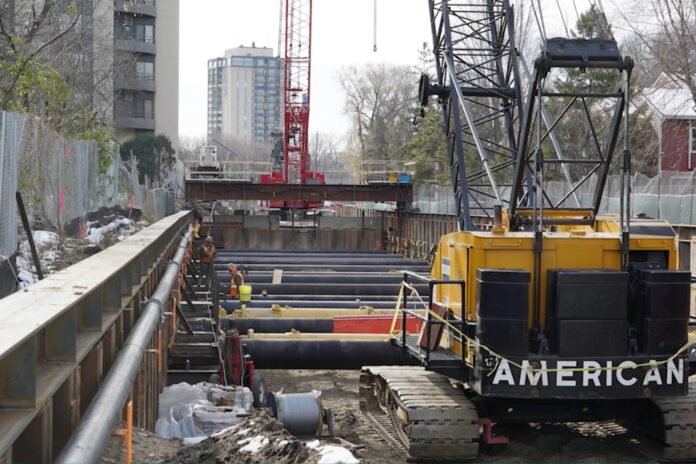
The latest Southwest light rail report from the Office of the Legislator Auditor (OLA) found that even as the decade-long project nears completion, its costs continue to blow past original estimates.
An OLA performance audit on the project released on Monday shows that the Twin Cities Metropolitan Council, which is managing the project, “had instances of noncompliance with the requirements we tested and weaknesses in internal controls in each area we reviewed.”
“We found that for the 41 change orders we tested, the Council accepted a wide range of variances in estimates when approving change orders,” the report says.
One example cited in the report includes an instance where the Met Council’s revised construction costs for a retaining wall along the project line were $47 million more than originally estimated.
While the Met Council’s original estimates for that project came in at around $36 million, its contracted construction company estimated the same work would cost more than $82 million. Those kinds of cost overruns have led the project to balloon from its original $1.3 billion cost to an updated cost of $2.86 billion.
It’s also led to continued criticism from legislators on both sides of the political aisle.
During a Monday hearing of the Legislative Audit Commission, members of the House and Senate reviewed the latest performance audit and criticized Met Council Chair Charlie Zelle and staff who, during the meeting, offered rationale for some of the cost overruns.
“I think what we are continually seeing is—I love that you pat yourself on the back a lot today—this project started out almost a decade prior to 2013, and the 2013 estimate for this project was actually $1.3 billion,” Sen. Mark Koran, R-North Branch, reminded the Met Council.
“I don’t think the citizens of Minnesota have comfort enough to, if they had a choice, allow the Met Council to take on another rail project or continue the ones you’ve already started,” Koran continued.
Sen. Cal Bahr, R-East Bethel, put it simply: “There’s a big problem in the Met Council, the way they conduct business spending other people’s money.”
“People went to work every day, worked hard for this, and the Met Council on all three of your light rail projects has come in so far over budget, it’s like you don’t care,” he said.
Cost has more than doubled since project was first conceived
The heavily scrutinized extension of the light rail Green Line will span 14.5 miles between Minneapolis and Eden Prairie. It’s been under the microscope for the past few years after it was announced that the project would be another $700 million over budget and four years behind schedule.
The project, which will include 16 new transit stations along its route, is now set to be completed in 2027. As the project nears completion, the OLA has conducted a handful of audits on the Metropolitan Council’s management of the project.
Two years ago, an OLA report concluded the Met Council was not fully transparent with the public about significant cost overruns and continued to make decisions that increased the cost even as its committed funding dried up.
Those cost overruns have been criticized by legislators from both parties and sparked a range of conversations, including the possibility of reforming the structure of the Met Council or handing over projects to the Minnesota Department of Transportation.
“We see that there are needs for reform and modernization with the Metropolitan Council,” Rep. Rick Hanson, DFL-South St. Paul, told Met Council officials during the April 7 meeting. “Having sat through several of these, there is always a rationale or an excuse. I do appreciate that the project is nearing completion, but reform is necessary, even incremental reform on how the council does business or how it’s structured.”
With the project expected to open to riders in 2027, Koran said in a statement following the meeting he has no confidence the line will prove financially viable.
“I’d like to hope this project pays for itself but we all know it won’t. From the start, there’s been no clear plan, no serious cost controls, and no accountability for vendors,” Koran said. “This report confirms what many of us have been saying for years: the Met Council has failed to protect Minnesotans’ tax dollars and should have taken action to correct course a long time ago.”
Those criticisms come on the heels of discussion among legislators that the Northstar Commuter Rail should be closed down due to a precipitous drop in ridership that has resulted in an annual operating loss of more than $11 million.
Hank Long
Hank Long is a journalism and communications professional whose writing career includes coverage of the Minnesota legislature, city and county governments and the commercial real estate industry. Hank received his undergraduate degree at the University of Minnesota, where he studied journalism, and his law degree at the University of St. Thomas. The Minnesota native lives in the Twin Cities with his wife and four children. His dream is to be around when the Vikings win the Super Bowl.











